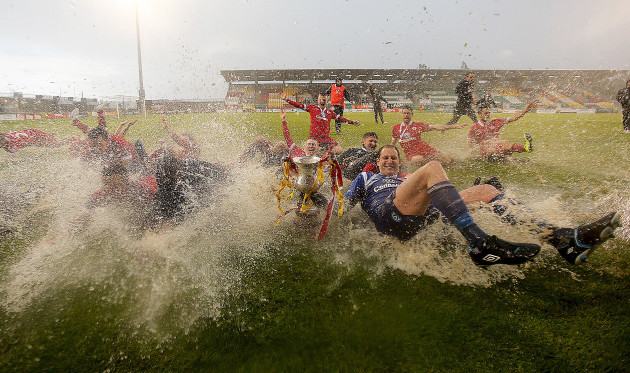THERE’S A COMMON sense solution to each of our league’s issues.
However one ‘magic bullet’ that lacks common sense is the widely held belief that multiple issues can be simultaneously solved by a cross-jurisdiction league, one involving Northern Irish and/or Welsh teams, an All-Ireland or Celtic league.
Scottish teams are occasionally mentioned, but even those pushing it know that’s unrealistic, given the relative financial strength of their league.
“Imagine Linfield in Turner’s Cross,” people say. “Imagine Ballinamallard in Athlone,” is a typical response.
You cannot reduce a restructuring of the league down to a couple of unrepresentative games. It’s the mistake that First Division clubs make when advocating a single division. A single visit of Shamrock Rovers or Cork City, who may bring a large traveling support, won’t be a drop in the ocean against your costs.
The support of cross-jurisdictional leagues is based on one fundamental assumption; that such a league is automatically more attractive to supporters, sponsors and TV companies, generating additional income. There is no evidence it will be attractive beyond the short-term; once the novelty wears off advocates underestimate how much consistent income would be needed to offset the many genuine reservations held by clubs and associations.
The typical response to coherent arguments against a cross-jurisdiction league is that to dismiss it without testing it is blind. In a way, it has already been tested, and has failed.
We have had multiple Setanta Cup competitions across shifting formats, times of year and nights of the week. The competition underwent consistent tweaking to benefit of the Irish League clubs; as prize money fell, Irish league clubs withdrew as the benefits no longer outweighed the risk to their domestic seasons. There is limited interest in the competition from supporters, sponsors and clubs.
We needed the competition’s novelty to be replaced by a genuine rivalry. It never happened. On the subject earlier this year, journalist Daniel McDonnell put it best: “It’s the traditional foes that are a real magnet for crowds”. The novelty has worn off and neither the rivalry nor level of competition is engaging, with League of Ireland clubs largely dominant.
Expanding the competition to include Welsh – or even Scottish teams – only adds to the central issues. Travel costs for all competing clubs would be hugely increased without any evidence of additional income to offset it.
Welsh FA participation does not mean Cardiff City and Swansea City. The idea that the wider public, sponsors and TV companies will be engaged by the prospect of Bala Town, Port Talbot or TNS as league rivals doesn’t add up. To quote McDonnell again: “The novelty value of an unfamiliar opponent has failed to captivate the floating spectator because they know so little about the personalities plying their trade in an inferior league.”
Of course, the loudest objection would be from clubs with a realistic chance of recurring European qualification. Every year, across the League of Ireland, Irish League and Welsh Premier, three clubs compete in Champions League football and nine compete in the Europa League with an occasional ‘Fair Play’ place awarded. That is a guaranteed income of at least €3,450,000 coming into those clubs collectively.
It is ludicrous to suggest that a new All-Ireland League or Celtic League could retain 12 European places. The best clubs would find it two or three times as difficult to reach European football with the increased challenge. That is a significant issue for many of the clubs who would have to agree to sign up to the league.
The financial aspect is further complicated by the money the individual FAs draw down from UEFA for operating licencing, disciplinary and league offices. A central administration point would be needed meaning two FAs would lose a partial income that the league offers, if only in cash flow terms, if that money does find its way into league administration. It’s also pointless to pretend that there would be seamless cooperation across the respective ‘blazers’ in the different football associations.
We’ve been here before and the ongoing conversation perhaps reflects the sense that the 2007 Platinum 1 (P1) proposal was ‘never given a chance’. P1’s proposal made lofty claims in an environment where, and at a time when, lofty claims were the norm for our league. They abandoned it 12 months later, citing a lack of support from FAI and IFA.
Some clubs did offer vocal in their support to P1. It’s probably telling that the most supportive clubs in early 2008 were Cork City, Drogheda United, Derry City, Limerick 37 and Galway United. Whether the risky behaviour of those clubs scared P1, or reflected P1’s own approach, hindsight suggests had they been among the smaller All-Ireland league, that league might not have lasted long.
I was at a meeting in 2008 where Cork City fans were told the All-Ireland league was “a rising tide that would lift all ships” and I see such phrases repeated to this day. Structural solutions to the League of Ireland’s woes are complicated and often draw the cliché ‘rearranging the deckchairs on the Titanic’.
To continue that analogy, a cross-jurisdiction league would serve only to tether other boats to the Titanic and allow them to be dragged under behind it.



